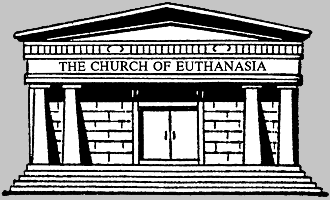
|
| Church of Euthanasia |
The One Commandment: "Thou shalt not procreate" The Four Pillars: suicide · abortion cannibalism · sodomy |
|
SAVE THE PLANET KILL YOURSELF |
|
news ·
resources ·
e-sermons ·
snuff it ·
family album music · video · catalog · faq · press · links · contact |
Issue #12 – De/production without cons/des/tructionAfter a dream in which an extraterrestrial intelligence warned them that the planetary ecosystem was collapsing, the situationist artist and electronic musician Chris Korda founded their ‘religious’ Church of Euthanasia movement in 1992, which they endowed with a single commandment: ‘Thou shalt not procreate’ and a slogan repeated everywhere from house records to banners: ‘Save the Planet – Kill Yourself.’ Thirty years later, the grotesque comedy of this nihilistic stance hasn’t worn off, while its observations on the state of the planet appear all the more bitterly visionary and intra-terrestrial. Urgent questions arise in the face of the devastation of ecosystems and resource depletion. These emerge in a singular way in a school of Art and Design, where students are trained to produce objects. How can art and design practice be combined with ecological issues? Does production necessarily imply a form of destruction? What forms might a turn towards deproduction take? This feature considers these issues via three complementary approaches. Firstly, it looks at the practicalities of measuring the impact of a project that makes it possible to acknowledge emissions and reorient practices in a virtuous way. The carbon calculator project initiated by Yves Corminboeuf, sustainable development delegate at HEAD, is presented here using the actual case of a Talking Head conference. Historically speaking, the hypothesis of deproduction echoes different conceptual and critical practices that have questioned the status of the object or the directive to build a career. At a time when the utopia of digital dematerialisation is proving to be very energy-consuming, David Zerbib engages in a reflection on the contemporary dialectic of the material and the immaterial. Departing from conceptual art practices, he sees the emergence of ecosystemic thought within the very instability and multiple reconfiguration of contemporary artistic productions. Logically speaking, the watchwords of this questioning of productive logic are resource conservation. The pursuit of this objective takes multiple paths and is often filled with joy rather than a sense of deprivation – as are Chris Korda’s songs. Removing, undoing, giving up, recycling, repairing, reallocating, sabotaging become practices in themselves. A series of articles in this feature focuses on a few radical practices, by historical and/or recalcitrant figures in art and design, but also by HEAD students and teachers who rethink their production, improduction or deproduction in the light of the ecosystemic challenge. Sylvain Menétrey |